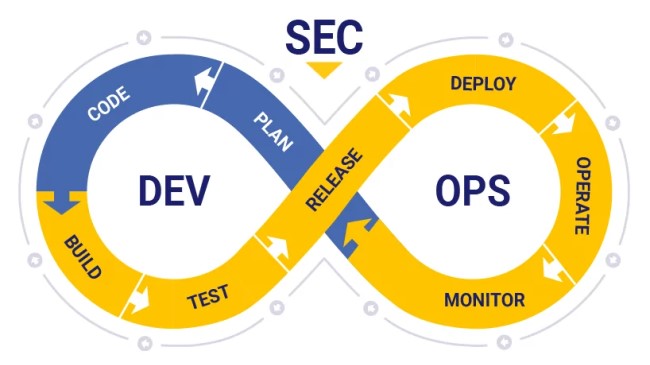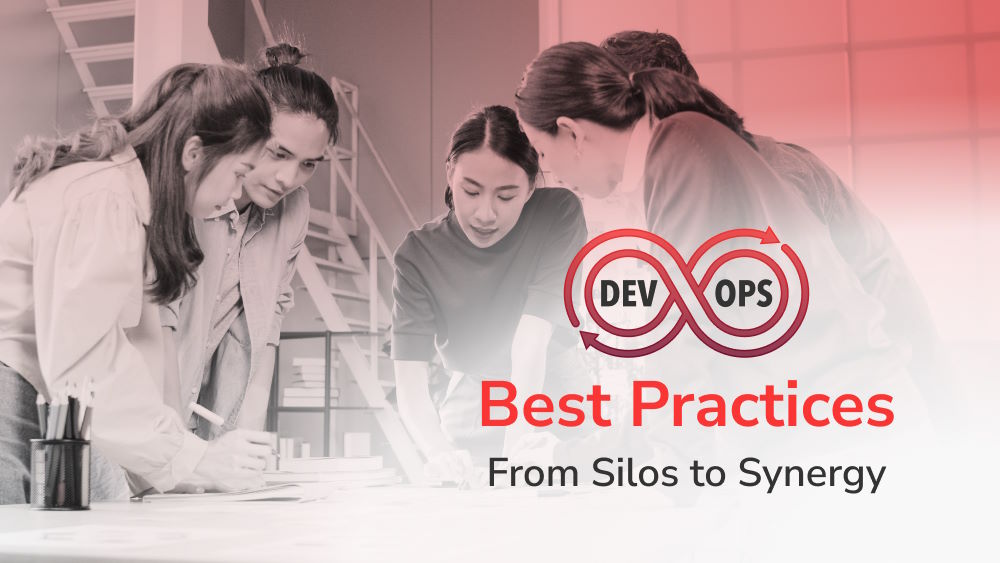What is DevSecOps and What Are Its Business Benefits?

Content Map
More chaptersWhat is DevSecOps?
DevSecOps stands for Development, Security, and Operations – is a term used to describe the process of implementing automatic security measures at every stage of the software development cycle.
The purpose of DevSecOps is to replace the traditional approach to security – which was often last-minute, haphazardly tacked on at the end of a development cycle – with a more proactive, integrated approach that considers security throughout the development process.
What is DevSecOps required to do to achieve these outcomes? Make security a shared responsibility between all departments, including the development and operations teams. Not only does this help prevent ‘siloed’ thinking, but it also enables all teams to consider security at every stage during the development cycle, making it easier to identify potential security risks early and implement the right solutions at the right time.
What is the difference between DevSecOps and DevOps?
DevOps is a concept that encourages increased collaboration between development and operations teams, enabling them to envision, deliver, and maintain software applications at a consistently rapid pace.
DevSecOps is a natural evolution of this philosophy, one that gives equal importance to security just as much as every other design aspect of a software application. In doing so, security measures can be implemented in a manner that complements the final design of an application, as opposed to being a mere afterthought.
Benefits of the DevSecOps approach
What is DevSecOps good for? There are many benefits to incorporating DevSecOps into your development cycle.
These range from increased productivity and efficiency through to more reliable security measures and greater collaboration between all departments.
Most importantly, adopting a DevSecOps approach is less costly than traditional security implementation measures, as resolving serious issues later is more complex and time-consuming than doing so early on.
Stronger, more reliable security
Before DevSecOps, security was often a last-minute consideration, handled by a separate, dedicated security team. Security would sometimes be implemented haphazardly, with little consideration as to how such measures would fit within the context of the application itself, resulting in an increased risk of cyber-security risks and vulnerabilities.
With DevSecOps, security is given the attention it deserves straight away. This enables all departments to work together by sharing their knowledge and expertise in order to devise a custom security solution that works within the context of the application.
Furthermore, by implementing frequent micro-updates throughout the application lifecycle, the software is safe from the latest threats as they occur.
Smarter collaboration, smoother workflow
These days, companies with a DevSecOps culture require their team to be knowledgeable in various fields.
This means both Development and IT Operations teams are required to possess a certain level of knowledge in the field of security and vice versa. In doing so, this enables all team members to take security into consideration as it relates to their unique contribution to a project.
As a result, it is easier for all team members involved to play their part in keeping their applications safe, secure, and compliant, as opposed to placing the burden solely on dedicated security specialists.
Faster, rapid software delivery
Software and application development can progress at a much faster pace than ever before. Not just in terms of launching a product but pushing out post-launch updates as well.
What is special about DevSecOps is that doing so is much faster, cheaper, and more efficient. That’s because, each step of the way, the code can be reviewed, scanned, audited, and tested for security purposes at virtually any time.
As a result, any potential errors can be addressed early before they become a complex and time-consuming task. This dramatically helps speed up the development cycle, enabling clients to launch their products sooner and gain an advantage over their competitors.
Automated security testing
Automation and automated security testing are key elements of any security solution. By removing the need for development, operations, and security team members to perform manual security tasks – not all, of course, but relatively simple tasks like code auditing and scanning – this gives team members free hands to innovate in areas where they excel the most.
On top of this, automated security testing tools help flag potential security risks early, giving team members the free time and space they need to resolve them prior to launch. This way, security is seen as less of a rushed, last-minute inclusion and more of an element that is just as crucial as every other aspect of an application.
DevSecOps Best Practices
As previously stated, making DevSecOps part of your design philosophy is more than just implementing automation and cloud services into your workflow. It’s about embracing a new approach to software and application development.
Instead of each department working separately in silos, they work together in harmony, combining their pool of relevant skills and knowledge, so as to give equal priority to every aspect of the project – as opposed to leaving features (like security) in the corner, until the very last minute.
The best DevSecOps practices will depend on the needs and wants of your organization, as well as the expectations of your end-users.
What security risks pose the biggest risk to your application and users? How can the right security measures be implemented in a way that is safe, low on resource usage, and non-disruptive to the user experience?
Most importantly, how can you implement security in a way that is easily scalable, enabling you to incorporate urgent, last-minute updates in the wake of new and emerging security threats?
By answering questions such as this, you will gain a deeper understanding of what a DevSecOps approach can do for your organization and how to maximize the potential of useful measures like automation and cloud services.
Last but not least, education is key to a successful DevSecOps culture. Take the time to bring your individual departments together, explain what DevSecOps is (and its benefits), and provide them with the tools, knowledge, and resources they need to implement the right security controls into each project they work on.
Modernize your development cycle with DevSecOps

The days of security being seen as a last-minute measure are long gone. Nowadays, clients and customers expect their applications to be consistently safe, reliable, and secure from the moment of release – right through their entire lifecycle.
With a traditional approach to security implementation, pushing out frequent micro-updates to security practices and features is virtually impossible. It places the burden solely on dedicated security experts, who cannot keep up with such a demand.
By sharing the workload evenly among different departments – from development and organization through to security – enables the team to consider security at every stage of the development cycle. The result is applications built from the ground up to be safe and secure, as opposed to having a ‘layer’ of security slapped on top at the last minute.
Of course, this benefits development teams and the end-users – who are guaranteed a higher-quality product that meets and exceeds their expectations.







